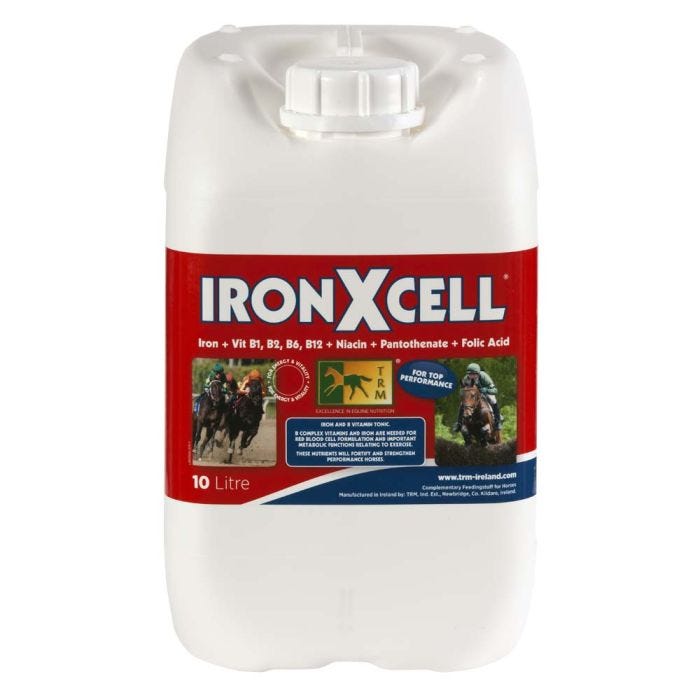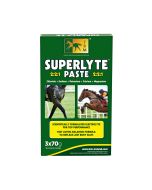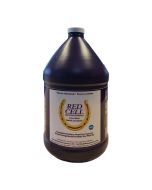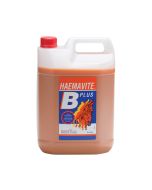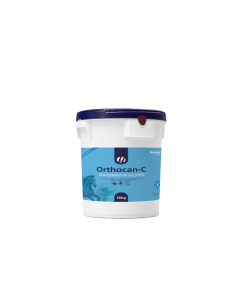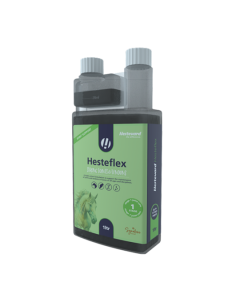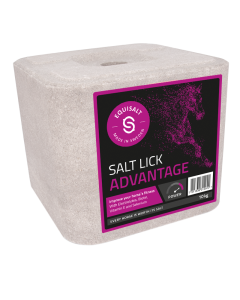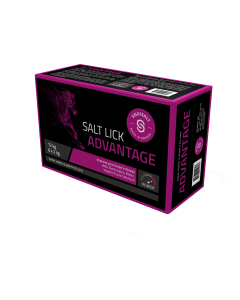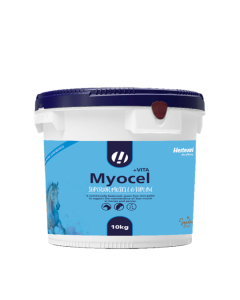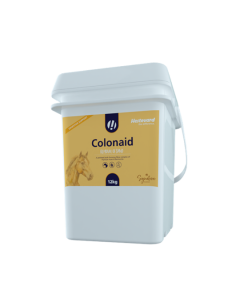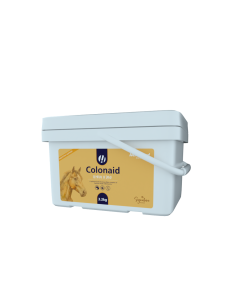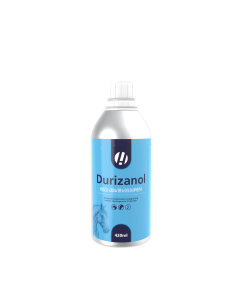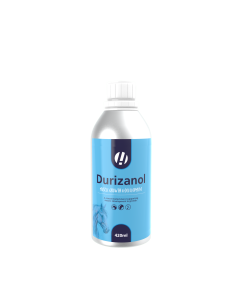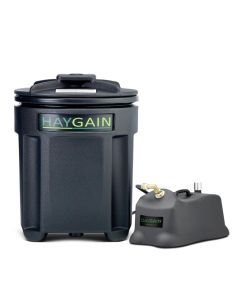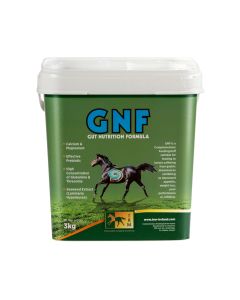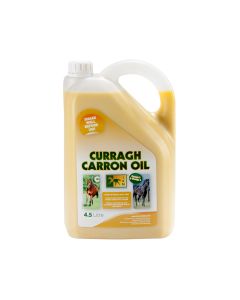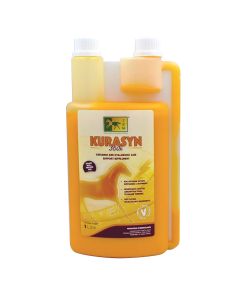Horses in training: Feed 60ml (approx. two fl oz) daily.
Yearlings: Feed 30ml (approx. one fl oz) daily.
As a general tonic: Feed 60ml daily.
Ironxcell complies with FEI & Jockey Club rules
IronXcell Contains
B Complex Vitamins ÇƒÏ The Water-Soluble Vitamins
Water-soluble vitamins include the B complex vitamins and vitamin C. Since B vitamins are not soluble in fat; they are not stored to any great extent in the body. Therefore, daily production or supplementation of these vitamins is required. B vitamin supplementation is warranted in the performance horse due to the consumption of a high grain / low forage diet, which limits the ǃÚnaturalǃ٠production of B vitamins in the hindgut. Clinical B vitamin deficiency signs are rarely reported in the horse, however, the absence of classical vitamin deficiency signs does not necessarily imply optimal vitamin status. Performance horses have higher demands for B vitamins because a) their diet is very energy dense and b) they have a greater turnover of red blood cells. B vitamins are needed for carbohydrate, fat and protein metabolism. If there is insufficient B vitamins, then the conversion of chemical energy to mechanical energy from ingesta may be inefficient in the performance horse. As a group, the B vitamins may be divided into two major subgroups, (1) those that act as cofactors in the release of energy from food and (2) those that act in the formation of nucleic acids and red blood cells. Since the B vitamins are directly involved in either energy release or red blood cell formation, their supplementation is fundamental in the hard-working performance horse.
The Energy Releasing B Vitamins
Thiamin as thiamin pyrophosphate (TPP), niacin as nicotinamide adenine dinucleotide (NAD+), riboflavin as flavoproteins, and lipoic acid all function in the tricarboxylic acid (TCA) cycle. The TCA cycle is the name given to the aerobic combustion of acetate to carbon dioxide and water resulting in the production of energy, which is eventually provided to muscle cells as high energy phosphate in adenine triphosphate (ATP).
Thiamin ÇƒÏ Vitamin B1
There is limited storage of thiamin in the horse, which indicates that horses need a regular supply of this vitamin in the diet. Thiamin plays a very important role in glucose metabolism. Since the breakdown of carbohydrates is increased during racing or performance, it is important that thiamin be available in sufficient quantity. Thiamin is heat labile; hence the availability of thiamin from commercial feeds is usually very low. The addition of supplemental thiamin to the diet of performance horses has received particular attention as
- (1) the diet of the performance horse is very energy dense, hence, there are greater demands on thiamin for glucose metabolism,
- (2) thiamin is thought to reduce lactate levels, which may also improve the anaerobic threshold level in supplemented horses
- (3) thiamin is reported to have a calming effect in highly strung horses
Ironxcell contains 150mg of vitamin B1 per 60ml, which is a concentrated level to meet metabolic needs in the high performance horse.
Riboflavin ÇƒÏ Vitamin B2
Riboflavin is an essential constituent of the enzyme flavin adenine dinucleotide (FAD), which is needed for the utilisation of fats, carbohydrates and proteins in the body. Riboflavin is not absorbed well and is excreted in the urine, which means it needs to be supplied regularly since little storage occurs in the body. There is a greater demand on riboflavin with increased feeding and exercise in the horse.
Ironxcell contains 75mg of vitamin B2 per 60ml which is the optimum feeding level of B2 in the diet of the performance horse.
Niacin
The first signs of a niacin deficiency in a species are loss of appetite, reduced growth, generalised muscular weakness and diarrhoea. Niacin, like all of the B vitamins is involved in energy metabolism as nicotinamide and forms part of the structure nicotinamide adenine dinucleotide (NAD+), which is needed for the release of energy from fats, carbohydrates and proteins. Like all B vitamins, there is a greater utilisation of niacin by horses in hard work on very energy dense rations.
Ironxcell contains 200mg of niacin per 60ml daily dose.
Pantothenic Acid ÇƒÏ Vitamin B3
Pantothenic acid functions as a carrier of acetyl groups in the form of acetyl coenzyme A, which makes high energy bonds, the most important of which is acetic acid. Acetic acid is formed from the catabolism of both fats and carbohydrates. The higher the energy density of the diet, the greater the need for pantothenic acid, therefore high performance horses need supplemental pantothenic acid.
Ironxcell contains 80mg of vitamin B3 per 60ml.
Ironxcell is a an excellent supplement which can help excel the chance of a winning performance by ensuring optimum nutrition!
The Haemopoetic Vitamins
Pyridoxine ÇƒÏ Vitamin B6
B6 is the first of the haemopoetic (red blood cell forming) vitamins. The active forms of pyridoxine are involved in most reactions of amino acid metabolism and red blood cell formation. Pyridoxine needs are related to energy demands on the body. Therefore, high performance horses have a greater need for supplemental B6 in the diet. Signs of pyridoxine deficiency in other species include reduced growth rate, muscular weakness, impaired immune function and anaemia.
Ironxcell contains 25mg of vitamin B6 per 60ml daily dose.
Cyanocobalamin ÇƒÏ Vitamin B12
Vitamin B12 is an extremely complex molecule, containing a cobalt atom at its centre. It is unique among the vitamins in that its absorption from the stomach requires the presence of another factor, called intrinsic factor. The absence of this factor can result in failure of B12 absorption and signs of its deficiency. The signs of deficiency include anaemia with enlarged red blood cells and also neurological changes with demyelination of nerves. Vitamin B12 is required for methionine synthesis, folate entry into cells and, is also essential for DNA synthesis. B12 supplementation is most often associated with red blood cell synthesis, as B12 is an essential cofactor in the formation of haemoglobin. Perhaps, of even more importance in terms of the performance horse is that vitamin B12 is also necessary for the conversion of the volatile fatty acid (VFA) propionate into glucose in the liver. High grain diets have been shown to increase the rate of propionate, which may in turn depress appetite in horses. Vitamin B12 can improve the conversion of propionate to glucose, thus helping restore appetite.
Ironxcell contains 150mcg of vitamin B12 per 60ml daily dose to ensure that the hard working horse receives an adequate supply of this important vitamin.
Folic Acid
Folic acid is normally present in relatively large amounts in fresh forage and other greens, and is considerably lower in hay and grains. Folic acid (folate) is needed for haemoglobin synthesis, as it is an essential constituent for DNA synthesis. The English researcher Allen concluded that stabled horses in training would benefit from routine supplementation with folic acid. Australian work on folic acid in the horse supports AllenǃÙs conclusion that there is increased utilisation of folic acid by horses in hard work. Allen recommended that horses in training should receive 20mg of supplemental folate per day. With regard to folic acid supplementation, it is important to remember that folic acid deficiency may lead to more than just reduced formation of red blood cells. Folic acid supplementation is therefore likely to be important in horses recuperating from surgery or upper respiratory tract and viral infections, where rapid wound healing and cellular regeneration are important.
Ironxcell contains 20mg of folate per 60ml.
Nutritional Composition
Additives
| per 60 ml
| per 1 Litre
|
Niacinamide
| 200mg
| 3,333mg
|
Vitamin B1
| 150mg
| 3,333mg
|
Pantothenic Acid
| 80mg
| 2,500mg
|
Vitamin B2
| 75mg
| 1,250mg
|
Vitamin B6
| 25mg
| 417mg
|
Folic Acid
| 20mg
| 333mg
|
Biotin
| 0.5mg
| 8mg
|
Vitamin B12
| 150mcg
| 2,500mg
|
Trace Elements
|
E1 Iron (as Ferrous Citrate)
| 150mg
| 2,500mg
|
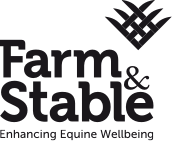

 Forgotten your password?
Forgotten your password?  Free Delivery on all orders over £95+VAT
Free Delivery on all orders over £95+VAT
 IRONXCELL_MSDS_1.pdf
IRONXCELL_MSDS_1.pdf